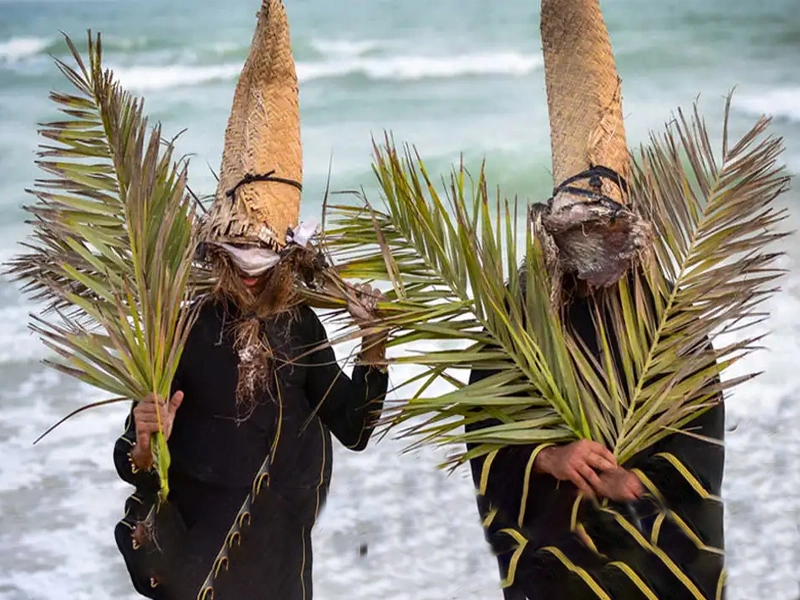
What is Sayyad Nowruz?
Sayyad Nowruz is a traditional festival celebrated on the first of Mordad in Qeshm Island. This ceremony symbolizes respect for the sea and marine creatures and has its roots in the beliefs and traditions of local fishermen. On this day, fishermen refrain from fishing, allowing marine life to swim freely.
Rituals and Customs of Sayyad Nowruz in Salakh
Sayyad Nowruz in Salakh Village is celebrated with unique rituals and customs:
Refraining from Fishing and Eating Fish:
Fishing is prohibited on this day, and eating fish or other seafood is also avoided. Women prepare traditional sweets such as Ranginak and Khabisa to serve guests.
Swimming in the Sea:
Locals believe the sea water on this day is sacred, and swimming in it protects them from diseases and misfortunes.
Wearing New Clothes:
People wear colorful new clothes, and old garments are symbolically released into the sea to drive away bad luck.
Decorating with “Golak” Clay:
“Golak,” the red soil of Hormuz Island, is used to decorate doorways and animals. This red clay symbolizes prosperity and the arrival of a new year.
Razif and Shushi Ceremonies:
Razif Dance:
Razif is a traditional dance performed by fishermen to honor maritime traditions. In this ceremony, local men in white clothing express their joy through rhythmic movements accompanied by drum music.
Shushi Performance:
Shushi is a puppet show that portrays the struggle between good and evil. The character Shushi, with his strange appearance, purifies himself in the sea at the end of the performance and transforms into a normal person.
Other Exciting Activities on This Day:
- Local Competitions: Swimming, tug-of-war, running, rowing, and diving.
- Handicraft Exhibitions: Island women showcase their crafts in a dedicated exhibition.
- Serving Local Sweets: Popular treats like Ranginak and date pastries are served.
Roots and Philosophy of Sayyad Nowruz
The roots of this festival lie in the fishermen’s beliefs. By refraining from fishing for one day, they show respect for marine life and the preservation of the environment. This celebration is also an opportunity to express gratitude to the sea as a source of livelihood and blessing.
Fishermen in Qeshm follow a unique calendar divided into four distinct seasons:
- Joza: 100 days starting in late Farvardin (April).
- Garma: 65 days beginning with Sayyad Nowruz.
- Sharima: Another 100 days.
- Winter: The final 100 days.
Salakh Village: The Center of the Festival
Salakh Village, with its rich history of fishing, is the main center for this festival. In the past, the village was known for catching large whale sharks. Although shark fishing is now banned, the village remains a symbol of fishermen’s culture.




